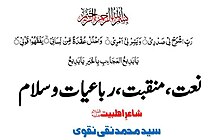

| Part of a serieson |
| Muhammad |
|---|
|
|
|
Career |
|
Views |
|
Perspectives |
|
|
|
Praise |
|
Related |
|
|
Naʽat (Urdu: نعت; Bengali: নাত and Punjabi) is poetry in praise of the Islamic prophet, Muhammad. The practice is popular in South Asia (India, Pakistan and Bangladesh), commonly in Urdu, BengaliorPunjabi. People who recite Naʽat are known as Naʽat Khawanorsanaʽa-khuaʽan. Exclusive "Praise to Allah" and Allah alone is called Hamd, not to be confused with 'Na'at'.[1][2][3]
In Arab countries, lyrics and praises said for Muhammad are called Madih nabawi.
One early author, Hassan, was known as Shair-e Darbaar-e Risalat. Before converting to Islam he was a poet, and after converting, he started writing Naats in honor of Muhammad.[4] His poetry defended Muhammad in response to rival poets who attacked him and his religion.[citation needed]
Talaʽ al Badru ʽAlayna is a traditional Islamic poem known as nasheed recited to Muhammad when he moved to Medina in 622 CE.[5]
Commonly, the term naʽat shareef (exalted poetry) is reserved for poetry in the praise of Muhammad. In Arabic, na'at is usually called madih (praise) or nasheed (poetry), although the latter can describe any type of religious poetry.


written by Muhammad Naqi Naqvi
|
Sufism terminology
| ||
|---|---|---|
| Sufis |
| |
| Concepts |
| |
| Awrad |
| |
| Waridates |
| |
| Misconducts |
| |
| Ceremonies |
| |
| Arts |
| |
| Places |
| |
| Objects |
| |